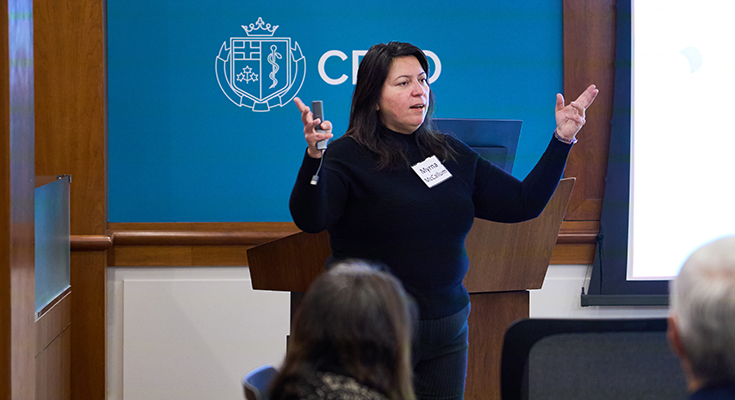
In this issue, we have several articles about the provision of trauma-informed care. These include the connection between adverse childhood experiences and disease, how to make your patients with trauma feel seen and heard and tips for creating a safe place for your patients.
Content Warning: This article contains references to physical abuse, sexual abuse and the trauma of the residential school system and may be upsetting to some readers.
By Katherine O’Brien
Métis-Cree lawyer Myrna McCallum has spent the better part of her career dealing with trauma. As a former crown prosecutor and adjudicator in the Indian Residential Schools Settlement Agreement claims process, she has listened to countless stories of traumatic experiences by Indigenous people.
Now, for the last five years, Ms. McCallum has been offering customized training courses on trauma-informed engagement, teaching professionals, including health care professionals, how to help change the systems they work in by avoiding doing further harm to others. One such approach asks that professionals adapt their practice to ensure that those they work with feel heard and seen, she says.
She encourages health care professionals to actively listen to Indigenous patients and to ask them how they feel and whether there is anything going on that might be informing their physical symptoms, she says. “Asking those questions is signaling that you’re interested in how people are experiencing you, not just the service that you provide.” To create a safe place for your patients, “it might mean listening more than you talk … It might mean confronting your biases, your beliefs, your opinions, parking your ideas and assumptions about people.”
A recently updated College policy, Human Rights in the Provision of Health Services, supports physicians taking steps to acknowledge themselves as learners when it comes to understanding a patient's experience, and to consider how social and historical contexts shape health and health-care experiences.
Ms. McCallum, who addressed the Board at its December meeting, also suggests regulatory colleges need to be mindful of their impact when communicating with people who have experienced trauma. “I don't think regulators and investigators understand fully how trauma impacts the way people show up, the way they behave, the way they communicate, the way they are asked to recall information,” she says.
At the root of her training lies the concept of cultural humility, which aims to shine a light on power imbalances inherent in institutionalized relationships, such as the patient-physician relationship. Ms. McCallum says this concept involves self-reflection and critique, a commitment to respecting different points of view, engaging with people authentically, and building connections and relationships. She contrasts this with cultural competence, which she sees as a self-centered approach that dismisses the importance of relationship-building.

Myrna McCallum, addresses the Board of Directors. (Photo credit: Arash Moallemi)
Recognizing the psychological risks
Everyone who works with people who have experienced trauma needs to recognize the psychological risks to the work they do, says Ms. McCallum, who addresses mental health and wellness in her training. She suggests that all people have some degree of trauma that they are either suppressing, confronting, or trying to heal from. “We need to understand that any time we're in a room with an individual like that, it's not just one person carrying trauma in that room, there's two people with trauma in that room. So, you acknowledge it and ensure that you don't start to take on the traumas of others so that you [don’t] start to feel their pain, horror and fear in your day-to-day life.”
Ms. McCallum says adopting practices that encourage self-reflection and self-regulation can shield people at risk of experiencing vicarious trauma or direct traumatization and help them develop patience, presence, focus and committed engagement, no matter what they face.
While an adjudicator with the Residential Schools Settlement Agreement claims process, Ms. McCallum often listened to stories of the sexual and physical abuse of Indigenous children. “[That] was hard to hear on a regular basis because if you have children, it’s close to home. But also, if you’re Indigenous, it’s especially close to home, and if you went to residential school yourself, it’s right there—and that was me, all three of those things.”
Eventually, she recognized she could serve others better if she found a way to live in balance, one where she was not always immersed in the pain of others. On days when she cannot avoid this, she makes sure to “wash off” the pain, so she can go into her next day feeling renewed. “That takes a real mindful practice to do this on a regular [basis] because it’s too easy to shut down, disconnect, and disassociate by checking out, picking up your phone and scrolling on endless sites …. But that doesn’t do anything to help you metabolize what you’ve just been exposed to.”












